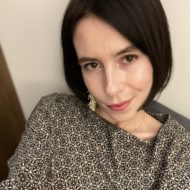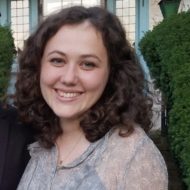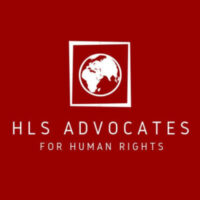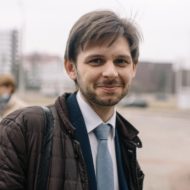 HLS Advocates for Human Rights is proud to present the Spotlight Series, a forum for essays and opinion pieces written by Harvard Law School students and alumni calling attention to pressing domestic and international human rights issues. If you are a Harvard Law student or alumnus/a and would like to contribute a piece to Spotlights, please contact Sondra Anton ([email protected]) or Anoush Baghdassarian ([email protected]).
HLS Advocates for Human Rights is proud to present the Spotlight Series, a forum for essays and opinion pieces written by Harvard Law School students and alumni calling attention to pressing domestic and international human rights issues. If you are a Harvard Law student or alumnus/a and would like to contribute a piece to Spotlights, please contact Sondra Anton ([email protected]) or Anoush Baghdassarian ([email protected]).
Please note that the views and opinions expressed in Spotlight essays are those of the authors and do not necessarily reflect the official policy or position of HLS Advocates for Human Rights.
Lawyering Under Dictatorship: An Interview with Yauheni Pylchanka and Vladislava Chalei
Interview by Ariella Katz (JD ’23)
In August 2020, thousands of people in Belarus took to the streets in what is believed to be the biggest protest movement in the country’s history. The protests were sparked by the falsification of the presidential election results, which purported to give Alexander Lukashenko – president of Belarus since 1994 – victory with over 80 percent of the vote. The United States, European Union, and others denounced the election results as fraudulent and refused to recognize Lukashenko as the legitimate leader of Belarus. Protesters rallied around Sviatlana Tikhanovskaya, former English teacher and wife of jailed opposition blogger Sergei Tikhanovsky, as the true winner of the election.
The protests were met with a brutal crackdown that led to the detention of over 25,000 people by November 2020. Human Rights Watch reported that protesters endured severe beatings and electric shocks, and were detained in overcrowded and unhygienic conditions often without food and water. In an effort to further silence dissent, the Lukashenko regime liquidated the remaining human rights organizations and shut down the largest independent news portal. Lawyers were at the forefront of defending those who were punished for democracy advocacy and soon they became targets too. This is the story of a lawyer who sacrificed his professional career to represent one of Lukashenko’s most prominent opponents.
On November 5, 2021 Ariella Katz (HLS JD’23) spoke with Yauheni (Yevgeni) Pylchanka, a Belorusian lawyer, who was disbarred after representing imprisoned presidential candidate Viktar Babaryka, and Vladislava Chalei, a Belarusian-American activist based in Boston.
Q: Thank you so much to both of you for speaking with me. I am deeply inspired by all that you do as human rights defenders. To start off, could you give our readers some context about what is happening in Belarus?
Yauheni: There were always problems in Belarus but they particularly intensified after the presidential elections which happen once every five years. In 2006, one presidential candidate was jailed. In 2010, six candidates were jailed. In 2015, the elections passed invisibly. But after all of these, the activists helping the candidates would be sent to jail.
In May 2020, new presidential elections were announced for August. And this time the situation was different because they were not just imprisoning candidates, but even people who wanted to become candidates before the elections even started. At the beginning of May, Sergei Tikhanovsky was arrested. He was a blogger who announced his intention to participate in the elections. But because he was arrested, he couldn’t even submit his documents to register as a candidate. His wife Sviatlana submitted the documents instead. And that is how Sviatlana Tikhanovskaya appeared on the international stage as the chosen leader of the Belarusian people. Tikhanovsky was jailed for fifteen days and then released. Then, he took part in his wife’s campaign but at the end of May he was arrested again.
My story is more connected to Viktar Babaryka. Babaryka was the chairman of one of Belarus’ largest banks for twenty years. After the elections were announced in May, he left the bank and announced his candidacy. He enjoyed a lot of support because he was known as a philanthropist and businessman. He got half a million signatures even though 100,000 was enough. Then, the government started spreading false information that he was backed by Russia. On June 11, fifteen people were arrested including employees of the bank where he worked and several of his family friends.
A week later, he and his son were arrested and placed in pre-trial detention. By that time, he already knew that he would be criminally prosecuted. His lawyers were Dmitry Laevski, the managing partner of the law firm where I worked, Aleksandr Pylchanka, my father, and Natalia Matskevich, a human rights and international litigation expert. My father was at one point the head of the Minsk Bar and one of the most famous lawyers in Belarus.
First, I didn’t take part in this case. After Babaryka was arrested, there were mass protests. People went out into the streets and stood on the sidewalks. There weren’t a lot of arrests then. In mid-July, when it was time for candidates to register, Babaryka was refused. This is when a lot of people went out to protest, and the police responded with violence. Sviatlana Tikhanovskaya was the only independent candidate left. All the other opposition campaigns rallied around her. It was a huge thing because we had never seen such activism in Belarus.
On the day of the elections, they shut off all the internet. No one knew what was happening. Some people waited for the results at the polls and other people gathered downtown. The police attacked people with rubber bullets and flash grenades even though the demonstrators were peaceful. People would go outside, and the police would shoot them. I didn’t understand the scale of it. I had been standing by my polling station waiting for the results, so I didn’t know what was happening. Three days later, seven thousand people were arrested for peaceful demonstrations. They were held in jails throughout the country including in the Okrestina detention center, where people were tortured. Sixty people, for example, were put in cells built for twenty. No one was fed. They would deprive people of sleep by forcing them to lie face down on the ground outside. They forced people to stand for hours facing a wall, spreading their legs and arms wide. They would force people to walk through lines of police who would beat them with batons.
The next day, the women came out to protest. On that day, no one was arrested. And a few days later, half a million people went out into the streets. It felt like everyone was there. Each Sunday there were huge protests. On the second week, they began arresting people again and, by December, the protests waned because people were seized and put into jails where the conditions were torturous. They weren’t given mattresses and they slept straight on the metal beds. There was no protection from COVID.
At the same time, they started to prosecute people for going to unsanctioned protests. And since the government doesn’t sanction anything, all the protests are forbidden. Now you can even be arrested for wearing the wrong clothes. Words on a t-shirt are considered a picket. For a television box that is red and white, the color of the national flag used by the opposition, you can be charged with a picket. For that you can get fifteen days of jail.
“The next day, the women came out to protest. On that day, no one was arrested. And a few days later, half a million people went out into the streets. It felt like everyone was there….”
Vladislava: One of the labor lawyers who is now imprisoned was initially jailed for fifteen days for making a protest video with his co-workers. The conditions were inhuman. And now he is imprisoned by the KGB.
Yauheni: Publishing something on the internet is also considered a picket. And you can be criminally prosecuted based on a video of you at a protest. If you are photographed standing in the street, you can be imprisoned for two years for blocking traffic. Of course, during the protests the whole street was filled with people. There were no cars at all.
 Image from Defenders.By
Image from Defenders.By
Q: How did you get involved in activist politics as a lawyer?
Yauheni: [Initially] I never did anything political. We tried to distance ourselves from politics and focus on legal questions. It is not that we didn’t support democratic change, but publicly we only talked about legal questions because there were problems even there. I began to work as a lawyer in 2012 and there were no big political cases.. And then last year it all began. Naturally, I immediately got involved even before the serious repressions began. I was talking about Viktar Babaryka who was defended by three lawyers. I was also on that legal team because I was supposed to participate. But because I was defending a close friend of his wife, who had passed away, I focused on working with her. It was a political case but the prosecution tried to make it economic, about tax evasion and bribes.
Many lawyers got involved defending people who were detained at the protests. There was a catastrophe because lawyers couldn’t get in the courts. First, the challenge was to find your client because no one tells you where he is detained, and where he will stand trial. The lawyers write to all the courts, and the courts answer nothing. The judges come straight to the jails and they hold the hearings there while the people accused, some of them don’t have clothes, they have bruises and blood. None of the lawyers were allowed in.
Eventually they started admitting lawyers, but the cases didn’t follow any legal process. For example, the only witnesses were plainclothes who hid their faces and refused to give their real names and even gave fake ones. In rare cases, our legal system works when the law says something unambiguously. If interpretation is possible, the law is not followed.
Vladislava: Tell them about the persecution of lawyers and how your dad was disbarred.
Yauheni: Well, [laughing] returning to the case that eventually led to my disbarment. As the protests are being violently put down, my father is working on Babaryka’s case. And he published an article on TUT.BY – the biggest internet site, which is now banned, about what officials should do when they see disproportionate use of force against demonstrators. There were sentences like the Minister of the Interior should be removed from his job, free the detainees for the just adjudication of their cases, stop the special forces who were breaking up the protests, and investigate their wrongdoing. There was nothing crazy in it – it was all based on criminal procedure. A month later, the Ministry of Justice demanded an explanation. Our Ministry of Justice controls who gets licenses to practice and can take them away. They told him that he was guilty of wrongdoing that is incompatible with his status as a lawyer. He allegedly made inaccurate statements and misled the public about what is legal. And the most interesting thing was that they never said what particular words of his were problematic. Only when we appealed the decision did they explain that demanding the end to prosecutions against people arrested for peaceful protests was wrong. He should have called to stop the cases against the innocent. He was disbarred. I think he was the first.That summer, we felt very free. We hadn’t felt that free for a long time because after the elections of 2010 they forbade lawyers to speak to the press. The lawyers themselves made sure no one talked to the press because multiple lawyers were disbarred then. For ten years there was silence. Lawyers were afraid of putting their names on things. In 2020, people started talking openly again. My father was the first who suffered for making such a publication. He was disbarred. We appealed and of course the court took the side of the Ministry of Justice. He was left without a job.
By January, the case against Babaryka was fully investigated and sent to trial. I was appointed to be defense counsel instead of my father. Three lawyers defended him. The trial lasted until June. In June, he was sentenced to fourteen years in prison. And two days later, they started disciplinary proceedings against Dmitry Laevski, the lawyer who led our team and was most active in the press. He was summoned by the disciplinary commission. Let me explain. There were eight people charged, Babaryka and others from the bank, but Babaryka was the only one who denied guilt. The rest pled guilty and said that they received bribes even though at the beginning they said the opposite. In fact, they had received legal dividends. So at the trial, the other defense lawyers were saying that a crime happened. They asked that their clients, who pleaded guilty, not be punished harshly. Laevski pointed out the inconsistencies in what these lawyers said. I spoke too. I didn’t say much, just commented on three facts, saying that this evidence was absurd. In his speech, Laevski said that not only his own client Babaryka was innocent but also all the others. The bar summoned him and expelled him for “publically assessing the statements of other lawyers” during the trial. He was told he doesn’t have a right to talk about the other lawyers. But he was disagreeing on the facts in court. I don’t understand what else you are supposed to do at trial other than argue. And the other reason he was expelled was for arguing that people other than his client were innocent. He “took on the role of their defender without asking for permission.” We have never heard of such an infraction and probably will never hear about it again.
After Laevski was expelled, I technically became the managing partner of our law firm. But the firm only had two people left. At the beginning of October, I was accused of criticizing other lawyers during the trial like Laevski and of defending someone with a conflict of interest. As I mentioned, I wasn’t initially involved in the Babaryka case because I was defending his girlfriend. They told me that I don’t have a right to defend her because they have a conflict of interest. But both of them asked me to defend them. The prosecutors knew I defended both of them. So did the court. His girlfriend was ultimately released without being charged. But suddenly I was told that I couldn’t defend both of them. And the prosecution filed to remove me from the case. On that basis, the disciplinary commission of the Minsk Bar found that I violated professional ethics and that I should be disbarred. Since last Wednesday [November 2, 2021], I am no longer a lawyer.
Natalia Matskevich was also defending Sergey Tikhanovsky. She was disbarred on the eve of his trial, three days before I was. She was working toward this trial for a year and a half. They said that she “interrupted an investigator.”
Maksim Znak, the lawyer for Babaryka’s election campaign, and member of the Coordination Council for the Transfer of Power, was seized by unidentified men wearing ski masks on September 9, 2020. He was sentenced to ten years in prison on September 6, 2021 after a closed trial.
We were prepared that they would stop us from representing people and that we could get disbarred. But when we were defending Babaryka, we didn’t think that they would disbar us before the sentencing. Every week now, I hear about disciplinary actions against lawyers. As soon as a lawyer writes something on Facebook, they say that he did not characterize the law correctly, that he did not sufficiently respect the government, and for this he is expelled. First, it was the Ministry of Justice that was disbarring people and then they sent these cases to the bar so that lawyers could disbar each other. All the lawyers who speak out or too actively defend political detainees are being punished.
“All the lawyers who speak out or too actively defend political detainees are being punished.”
Vladislava: So now Viktor Babaryka doesn’t have a lawyer. All the lawyers who were defending him and those who took the place of those that were removed have been disbarred themselves and can’t practice as lawyers. So he does not have any defenders any more. And this isn’t just Babaryka. Now, our country doesn’t have qualified lawyers, they all have done something wrong.
Yauheni: Yeah, I am a malicious and systematic breaker of the law.
 Photo provided by Yauheni Pylchanka
Photo provided by Yauheni Pylchanka
Q: It looks like the best lawyers and most active lawyers have been prevented from practicing. How do you see your work in the future? What are you doing now?
Yauheni: Now, I’m getting my stuff in order. By inertia I’m continuing to work but I need to find someone to whom I can pass on my cases. I am finishing some appeals. But of course, I can’t take new cases. I can only give advice, but I can’t get fees for it of course. Now, I can’t practice as a lawyer. Because I was a criminal litigator, I can’t work in my specialty again. Laevski, who was disbarred four months ago, initially helped me write briefs. But now I’m disbarred too, and I don’t have anyone to work with. And now all the cases are sealed. I don’t even have mediated access to criminal cases. What I will do I don’t know because I wasn’t planning on getting expelled. Lawyers can either leave and become lawyers in a different country or change their profession. Before, people would become human rights defenders but six months ago, half of the human rights defenders were imprisoned and all the human rights organizations were liquidated. Even ones more indirectly related to human rights, like organizations for writers. All organizations of civil society who can be seen as critical of the government have been liquidated.
“…when the repression started, the lawyers defending the people who were detained, they were taking a moral stand. You had to take a side. You couldn’t just ignore what was happening.”
Q: Can you do human rights advocacy outside an official organization?
Yauheni: Well, you can but you can go to prison for that. As a lawyer, what I was doing was legal. That was the only profession where you could speak out and it was OK. Now they need to remove all the people who speak, and it will be beautiful.
Q: You said that you didn’t plan to be disbarred but your colleagues probably knew about the risk of defending a presidential candidate and other activists. How did you make the decision to take on this risk?
Yaeheni: I didn’t plan to be disbarred in the sense that I didn’t know the date but, of course, I knew that sooner or later we would be disbarred. I thought it would be in the Spring when I had to take my re-qualification exam, but the process went faster. I knew the risks but when these cases began, I thought that we wouldn’t be living in a totalitarian state but in a free one. There were these hopes. I didn’t think about not taking the case because probably to be part of such a case is the goal of any criminal lawyer – I am being asked to defend the main political prisoner in Belarus. And before he was a prisoner, he was the main opposition leader even though he was not yet a politician. It was the kind of case you wanted to strive for. I could be punished for it, yes, but the case was worth it. I felt like we were doing something important and not just making money.
And when the repression started, the lawyers defending the people who were detained, they were taking a moral stand. You had to take a side. You couldn’t just ignore what was happening. Everyone understood the risks but after the elections they didn’t care. What we saw, it didn’t give us any opportunity to co-exist with this system. How can you go to court knowing that the judge has convicted the third beaten-up person that day and you go to her to talk about someone accused of theft and pretend that this isn’t happening? A lot of people couldn’t accept this system.
Harvard Advocates for Human Rights calls on Belarusian authorities to stop the persecution of lawyers and immediately release Maksim Znak, Aliaksandr Kapshul, and Ihar Mints, lawyers who were imprisoned for advocating for democracy.
YAUHENI PYLCHANKA
Yauheni Pylachanka is a Belarusian lawyer. He graduated from Belarusian State University in 2011 and joined the Minsk Bar in 2012. Yauheni specialized in criminal defense with a focus on official misconduct and economic crimes. In 2020-2021, he defended the political prisoners Viktar Babaryka, Sviatlana Kupreyeva, and the lawyer Maksim Znak. On November 2, 2021, he was expelled from the Minsk Bar.
 VLADISLAVA CHALEI
VLADISLAVA CHALEI
Vladislava Chalei is VP, Head of Corporate development at MyOme, a clinical genomics company. Prior to that, she worked at the Boston Consulting Group, focusing on healthcare. She was awarded a DPhil in Functional genomics by the University of Oxford in 2014, and held a postdoctoral fellowship from Harvard university Medical school / Mass General hospital. She obtained her BSc Honors degree in Molecular biology from Edinburg university in 2011.
 ARIELLA KATZ (JD ‘23)
ARIELLA KATZ (JD ‘23)
Ariella Katz is a 2L at Harvard Law School and the incoming Co-President of Harvard Advocates for Human Rights. She graduated from the University of Chicago in 2018. Afterwards, she was a Fulbright scholar in Russia where she started a creative writing and theater program for people transitioning to life after prison. She spent her 1L summer at the European Court of Human Rights. At HLS, she is also an editor of the Harvard Law Review.

